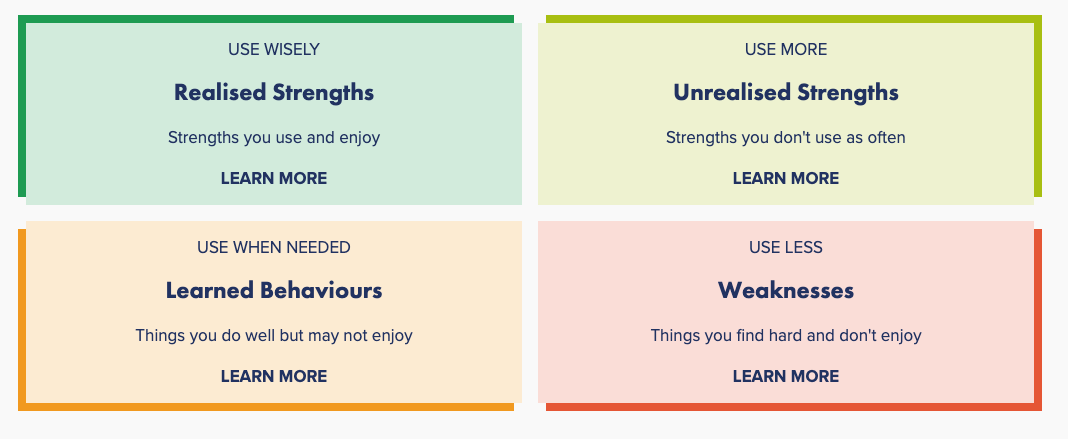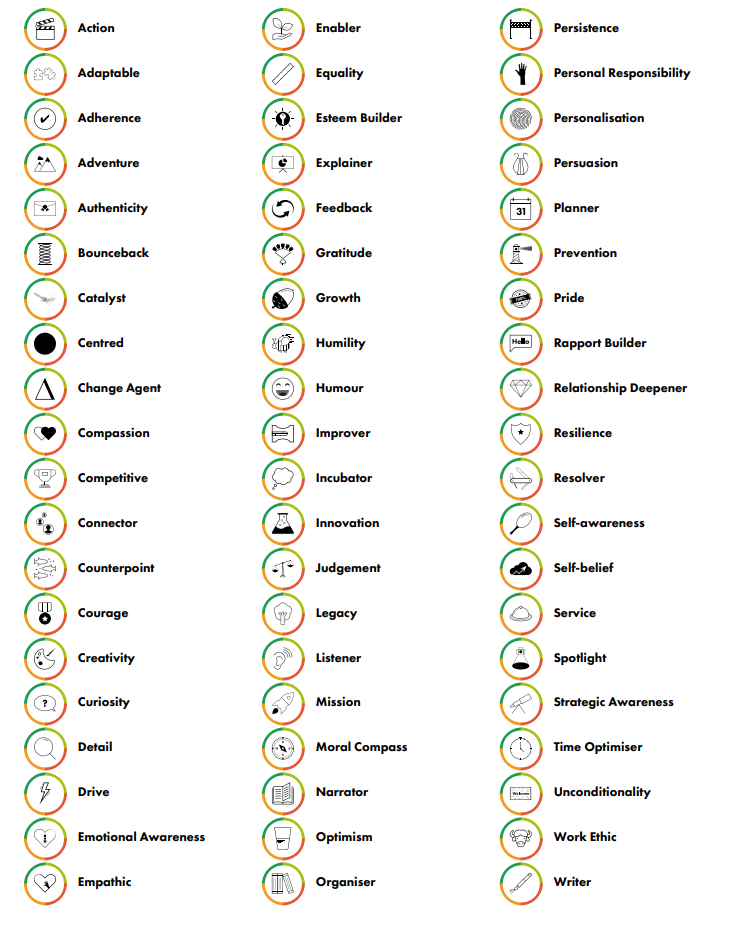Prompt 26: Strengths

What are your strengths?
Are you an original thinker, a leader, creative, genuine, good at teamwork, have a good sense of humour or a disciplined person?
Understanding our strengths is a powerful thing.
It helps to build self-confidence and self-awareness and can also help to put you in a more positive frame of mind leading to increased motivation and higher productivity, and a greater sense of life satisfaction.
It's also great for helping to identify activities and pursuits that will be meaningful and life-giving.
So this week's prompt is to identify our strengths.
For this week, we'll define strengths as they are written about in positive psychology, where they are often spoken about as 'Character Strengths' or 'Signature Strengths' - qualities or valued traits that you find naturally within you and that give you energy.
Types of Strengths
Note we're not talking about skills - which are things you're good at - but which may not necessarily give you energy. For example, I'm quite good at doing the dishes... but I don't enjoy it. I've learned that skill - but it's not a strength as such 😁.
A great deal has been written in the field of positive psychology about what strengths are and why it's good to identify them (I'll include some reading below), but two of the most cited researchers are Christopher Peterson and Martin Seligman, who has identified six categories strengths (or virtues) - each with a variety of strengths (totally 24 in all).

They are:
1. Wisdom
- creativity
- curiosity
- judgement
- love of learning
- perspective
2. Courage
- bravery
- persistence
- honesty
- zest
3. Humanity
- love
- kindness
- social intelligence
4. Justice
- teamwork
- fairness
- leadership
5. Temperance
- forgiveness
- humility
- prudence
- self-regulation
6. Transcendence
- appreciation of beauty and excellence
- gratitude
- hope
- humour
- spirituality
Peterson and Seligman came up with this list, having looked at many cultures and believing that all are found across various people groups and throughout history. They argue that each of these 24 strengths exists in all of us to varying degrees - but the pattern of our strengths and weaknesses is different in everyone.
Learn more about these 24 strengths and how to grow them in this TED Talk from Ryan Niemiec from the VIA Institute.
If you find this matrix of strengths helpful, they've developed a survey to help you determine which strengths might be strongest for you at the VIA Institute.
I found the survey interesting. I've done it twice (separated by a couple of months) and got slightly different results each time, but a few repeated, including Creativity, Curiosity, Spirituality and Leadership.
Other researchers have developed their lists of strengths and have explored the topic differently.
The Strengths Profile group divides their strengths into five groups (Being, Communicating, Motivating, Relating and Thinking) and has 60 overall strengths, while others don't like to be prescriptive about what strengths there are. They also have a free tool to help you to work out which of these strengths might be strongest for you.
Their definition of a strength is slightly different - less about a character trait and more about something you do.
"A strength is something we perform well at, is energising and we do often."
I quite like how their survey results are presented.
They identify your realised strengths (those you are already using), unrealised strengths (ones you might want to use more or develop), learned behaviours (things you do well but don't enjoy) and weaknesses (things you don't enjoy and find hard).

Their list of 60 strengths is also more granular and, in some cases, is a bit more action-oriented.

This survey was long, and the free results don't rank all of the strengths (as the VIA one does) it also gave me food for thought.
My realised strengths were 'explainer', 'writer' and 'esteem builder', which resonated.
My unrealised strengths were 'improver', 'compassion' and 'prevention (anticipating problems)', which I'll need to think about some more.
My learned behaviours were 'courage' and 'pride', and my weakness was 'organiser' (which is 100% the case).

How to Identify Your Strengths
As with every prompt I've written so far - there is any number of ways that you might take action upon this week's prompt.
You might find the free surveys on the two sites above will give you some food for thought but perhaps the most simple thing you could do this week is to start a strength journal.

Start a Strength Journal
The exercise is simple - to note down during the week every time you do something that gives you energy.
You might do it in a notebook or a note-taking app when you feel the energy flowing - or you might set aside a little time at the end of each day to reflect on what you experienced over the previous 24 hours.
As the week progresses, take note of any patterns you begin to see. Maybe you repeatedly do something every day that gives you a buzz, or perhaps different activities relate to each other that unlock some clues for you.
Red and Green Activities

A similar exercise I was once given a few years back was another take on the strength journal idea.
I was asked to keep a list of all the activities I did during the day and then assign a colour to each. Green was to be assigned to activities I enjoyed, was energised by, looked forward to and was good at doing without feeling depleted.
On the flip side, Red was assigned to exercises that I didn't enjoy, passed slowly, didn't look forward to, and required a lot of effort.
I also assigned yellow to any activity that I was neither energised or depleted by.
Each day I had to highlight the 1-2 green activities that most energised me (the greenest activity) and 1-2 red activities that most depleted me (the reddest activity).
It was a fascinating exercise and helped me think about how I used my time.
Ask a Friend

Another helpful way to explore this week's prompt might be to ask friends or family members what they see as your strengths.
Last weekend, Vanessa (my wife) was asked to give a speech at a friend's 50th birthday party. She did a great job telling a few amusing stories and highlighting some of the things that she loved about her friend (her strengths).
It struck me that if we only hear what other people see as our strengths every milestone birthday, we might miss out on an opportunity for growth.
While it may feel a little awkward to start a conversation with 'tell me about my strengths,' I think there would be much to be gained from stepping into that slightly uncomfortable space.
Throw what you hear into the mix of your strength journal and one of the surveys above, and you might see some more patterns!
PS: don't forget to give the gift of strength identification to your friend and family members too!
Once You've Identified your Strengths...
Identifying your strengths is a great exercise to do and can be quite an uplifting thing to know.
Perhaps just identifying them will be enough for you this week - but I suspect it is really what you do with that knowledge that is where the real benefits can lie.
I suspect that most of us are already putting time into some activities that are based on our previously identified strengths.
But perhaps this week's investigations will have unearthed a strength that you've not paid much attention to before (an unrealised strength).
The logical next step is to think about how you can 'realise' that strength by putting aside time to build upon it.
Look at the upcoming week's schedule and ask yourself how much of what you have planned is strength-based activity.
While we all need to do things that we don't necessarily enjoy or might fall into the 'weakness' category - by being intentional about scheduling some strength-based activity, we might just find we get to the end of our week with a bit more energy and motivation!

A Final Word on Strengths
My hope this week (and every week) is that we each discover something new about ourselves.
As always, there is a risk that in examining who we are, we come away from the process uncomfortable or disappointed with what we find.
The surveys and tools mentioned above seek to reveal not only our strengths - but also our weaknesses.
But keep in mind - the results of these kinds of tools don't define you.
You are so much more than that.
What matters isn't what a quiz or survey tells you - but what you do with the information.
Time and time again in my reading on this topic, I've seen experts say that whether we have a strength or a weakness in an area, there is always room for growth.
Strengths can be grown. Weaknesses can be too!
But in both cases - it takes intentional action to do that.
I hope you enjoy the exploration this week - do let us know how you go with it via the Facebook group.
And as I said at the top of this week's article - we now have comments below. You need to be signed in as a member of Find Your Spark (which also gets you the prompt emailed to you each week)!
First time reading? Sign up for our weekly prompts below.

Member discussion